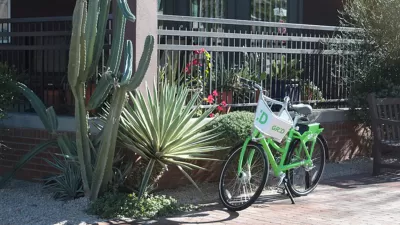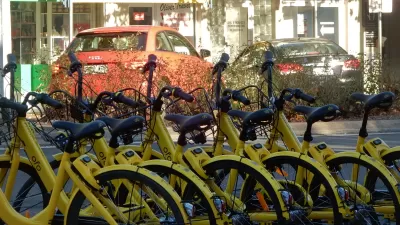Led by the companies Mobike and Ofo, so-called "dockless" bike sharing is all the rage in Chinese cities. Unlocked by app, the bikes can be left anywhere for the next user to pick up. There have been some hiccups.

Is "dockless" bikeshare a practical possibility? Maybe, judging from the success of operators Mobike and Ofo in China. Sherisse Pham writes, "The bikes can be locked and unlocked anywhere via a smartphone app, which means users don't have to return them to designated stations."
Now, this "game-changing" approach is getting its test run outside China. "One of China's largest operators, Mobike, unleashed 1,000 of its orange-wheeled bicycles in the rainy English city of Manchester on Thursday, marking its first foray outside of Asia."
As one might expect, operating a dockless bikeshare system comes with its share of challenges. "The rapid spread of this approach across China has already thrown up problems, including mountains of discarded bikes and companies going bust [...] To try counter those kinds of problems, Mobike and Ofo track their bikes through GPS and penalize users who hide bikes or park them in inaccessible places."
This data-intensive approach lets the companies finely tailor their logistics. "Prodding users to help redistribute their bikes is possible thanks to the data Mobike and Ofo collect on the millions of people who use their service daily -- they know when bikes are sitting idle, and when high traffic areas need more service."
FULL STORY: China's 'dockless' bike sharing could be coming to a street near you

Study: Maui’s Plan to Convert Vacation Rentals to Long-Term Housing Could Cause Nearly $1 Billion Economic Loss
The plan would reduce visitor accommodation by 25,% resulting in 1,900 jobs lost.

North Texas Transit Leaders Tout Benefits of TOD for Growing Region
At a summit focused on transit-oriented development, policymakers discussed how North Texas’ expanded light rail system can serve as a tool for economic growth.

Why Should We Subsidize Public Transportation?
Many public transit agencies face financial stress due to rising costs, declining fare revenue, and declining subsidies. Transit advocates must provide a strong business case for increasing public transit funding.

How to Make US Trains Faster
Changes to boarding platforms and a switch to electric trains could improve U.S. passenger rail service without the added cost of high-speed rail.

Columbia’s Revitalized ‘Loop’ Is a Hub for Local Entrepreneurs
A focus on small businesses is helping a commercial corridor in Columbia, Missouri thrive.

Invasive Insect Threatens Minnesota’s Ash Forests
The Emerald Ash Borer is a rapidly spreading invasive pest threatening Minnesota’s ash trees, and homeowners are encouraged to plant diverse replacement species, avoid moving ash firewood, and monitor for signs of infestation.
Urban Design for Planners 1: Software Tools
This six-course series explores essential urban design concepts using open source software and equips planners with the tools they need to participate fully in the urban design process.
Planning for Universal Design
Learn the tools for implementing Universal Design in planning regulations.
City of Santa Clarita
Ascent Environmental
Institute for Housing and Urban Development Studies (IHS)
City of Grandview
Harvard GSD Executive Education
Toledo-Lucas County Plan Commissions
Salt Lake City
NYU Wagner Graduate School of Public Service




























